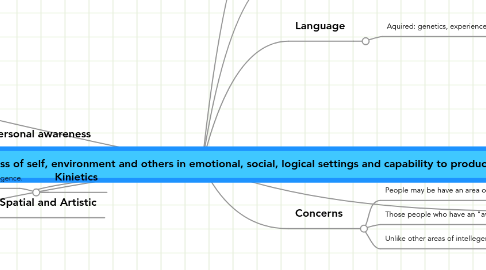Intellegence: Ability to reason, evaluate, adapt, learn, have awareness of self, environment and others in emotional, social, logical settings and capability to produce abstract thought in one, some or all categories.
by angelina renna

1. Logic, Math, Science
1.1. Aquired: genetics, environment, practice. A child who is exposed to a varitey of elements of science will have more oppertunity to learn. Being in an environmnet to practice and learn experience math can help raise intellegence. Logic can be improved by awareness and communication and experience.
2. Kinietics
2.1. Aquired: genetics, practice and experiece. Influential adults can provide a great oppertunity for kids to improve in this area of intellegence.
3. Personal awareness
3.1. Aquired: Experiece, educatoin and observation. If a child is taught to be aware of their feelings and body thay can build on this intellegence. Given the proper training and environment where growth in this area is supported can aid in intellegence. Having a varied of expereices can catalyse this as well as communication to identify differences.
4. Spatial and Artistic
4.1. Aquired: genetics, expereince, environment and practice.
5. Language
5.1. Aquired: genetics, experience, practice. Children who have been exposed to language have the oppertunity to learn more. If the are provided with an environmnet to practice this will also aid in raising intellegence.
6. Musical
6.1. Aquired: genetics, experience, practice, environment. Children who are exposed to music and supported have an oppertunity to learn more.
7. Observational/emotional
7.1. Aquired: genetics, experience, environment. Children that have a variety of expereinces will have the oppertunity to assess different people and their emotional states as well as characteristics. If kids are raised in an environment where communication is used to discuss other peoples deminore etc. can also help.
8. Naturalistic
8.1. Aquired: genetics, environment, practice. Kids who are exposed to different situations have the oppertunity to learn more.
9. Concerns
9.1. People may be have an area of higher intellegence such as being able to study and memorize, that may allow them to produce results that would portray a higher level of intellegence in a different catagorie. This could prove to be a high level of intellegence in one area but a false high level in another. Such as; memorizing math equations and not truly understanding the meaning, viewing a facial expression and making a conclusion not based on all factors.
9.2. Those people who have an "average" level of intellgence in all areas are not considered of higher intellegence, though when compared to someone who only has one area of high intellegence, they may be better suited for the fullfilling the definition.
9.3. Unlike other areas of intellegence, there is no test to determine a persons level of emotional intellegence or reasoning as well as some of the other abstract categories.


